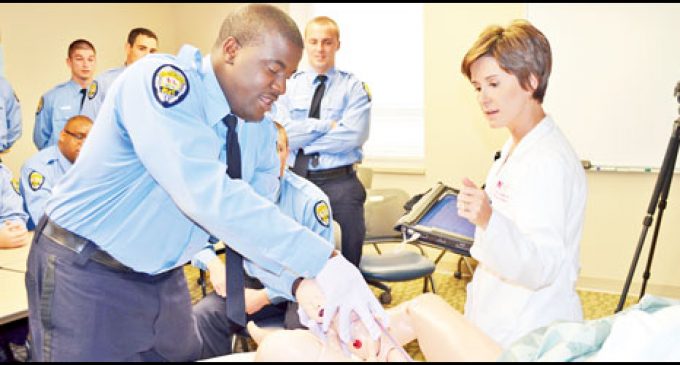Police trainees prepare for the ‘expectant’

Greensboro native William Armstrong has always known he wanted to be a cop.
“I always wanted to help people and try to uphold the law as best as I can,” commented the 23-year-old.
What the Winston-Salem Police Department trainee didn’t consider when plotting out his career in law enforcement was that delivering a baby might someday be a job requirement. Armstrong and his 29 fellow recruits visited Novant Forsyth Medical Center last week, to bone up on their labor and delivery skills, in case such a situation ever does arise on the job. For Armstrong, visiting the simulation lab and aiding a lifelike mannequin in delivering her newborn was one of the most daunting challenges he has faced during his 18 weeks of training.
“I’ve been dreading this moment,” the North Carolina Central University alumnus confessed. “That was well known.”
Despite his reservations, Armstong was able to successfully deliver the baby, under the watchful eye of Clinical Nurse Educator Dana Morris. Although he didn’t exactly relish the experience, Armstrong said he did walk away feeling more confident to address an emergency delivery if the need ever arises.
The lesson for the day?
“Be prepared for anything,” he said. “…Preparing for anything is what gets you ready for the field.”
Armstong’s class is the second group of recruits Sgt. John Morris has brought to his wife’s simulation lab to hone their labor and delivery skills. Sgt. Morris, who has 17 years on the force, says the simulation exercise is a big improvement over the training video that previously served as the recruits’ obstetrics training.
“Anytime we can step up the training, we’re going to take advantage of it, and make it as real as we can,” he said. “…This is a very young class – the oldest in the class right now being 27 – so this is probably the first (labor and delivery) experience that they’re going to have.”
Although he has never had to deliver a baby on the job, Morris, who has headed up the basic training academy for just over a year, says many of his colleagues have. He says the lab offers just one more way for him to ensure that the recruits are ready for the road ahead.
[pullquote]“It’s not always about arresting people. It’s about helping people” [/pullquote] [pullquote]“…It’s about service, and we need to train them for every service that we can provide.”[/pullquote]
Labor and Delivery Nurse Manager Nancy Pearson said the simulator, which is capable or hemorrhaging, seizures and delivering babies who can also simulate emergencies, has become an invaluable tool for conducting multidisciplinary training exercises for Novant’s own labor and delivery staff. Research shows that the hands-on nature of the simulation approach makes an impression on students of every stripe, Pearson added. The mother of four cited Armstrong as an example of what the simulation can do for a labor and delivery novice.
“He’s going to remember what he’s learned, and there’s a better chance that that mom and baby are going to be safer as a result,” she said.
Novant Forsyth offers the use of the $80,000 simulator to the WSPD and a handful of other community partners in Forsyth, Davie and Surry counties free of charge, absorbing the operation costs as a service to the community, because emergency deliveries at home or en route to the hospital happen frequently, Pearson said.
“It’s a significant investment, but if one mother or one baby can have a better outcome because of the drills that we do here, you can’t put a price tag on that,” she said. “…It’s definitely a benefit for us to partner with them. If they’re better prepared in the community to take care of mother and baby, then they’re in better shape when they get to us.”
Twenty-one-year-old Eddie Batres described his time in the simulation lab as “a great experience.”
“I was nervous. Even though I knew it was not going to be a live birth, it’s a nerve-racking experience, but I think it was great, because if we do encounter it out in the field, we’re going to be prepared,” the Chicago native said. “I think it’s a great tool for us, even if we never use it.”
Nurse Morris said the recruits fared well in the lab, in spite of their obvious discomfort with the process.
“I think they did great. They asked lots of good questions and seemed very involved,” she remarked. “I think they appreciated it.”
















